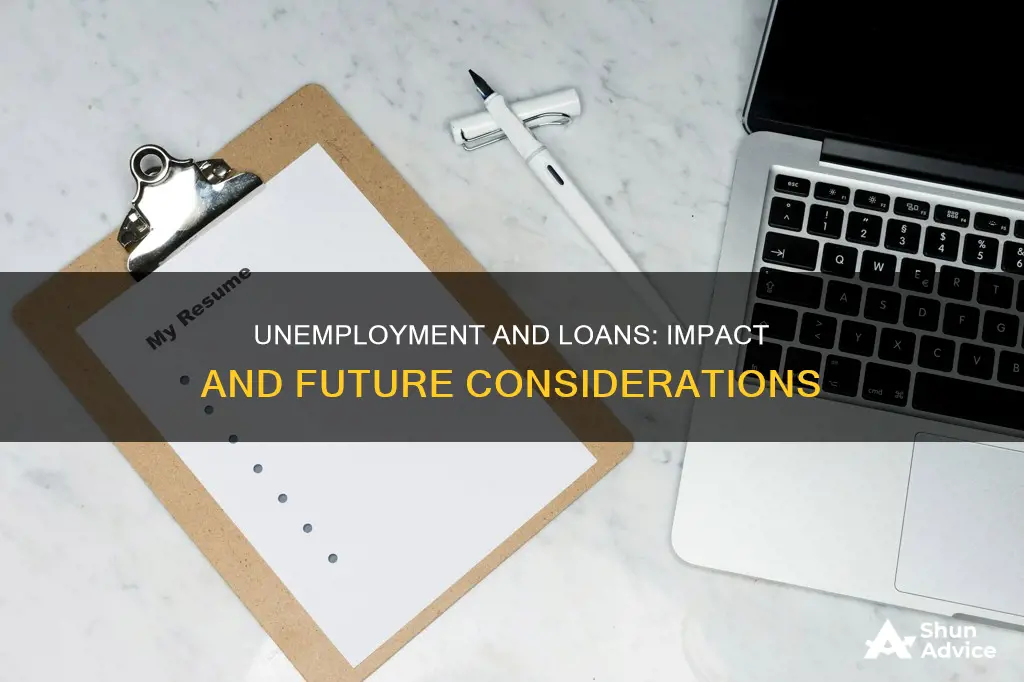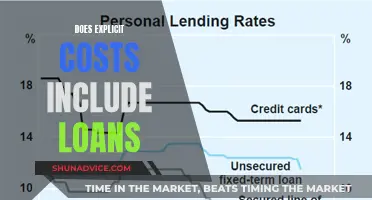
Unemployment can be stressful, and it's natural to worry about its financial implications, including its impact on your credit score and future loan prospects. The good news is that filing for unemployment benefits or receiving unemployment won't directly affect your credit score or appear on your credit report. However, unemployment often leads to a reduction in income, which can create a ripple effect that influences your credit score and ability to obtain future loans. This can include missing payments or increased credit card usage, both of which can hurt your credit score and how lenders perceive you.
| Characteristics | Values |
|---|---|
| Whether filing for unemployment affects future loans | No direct impact on future loans |
| Whether filing for unemployment affects credit score | No direct impact on credit score |
| Whether unemployment income is reported to credit bureaus | No, unless explicit permission is given |
| Whether unemployment can indirectly impact credit score | Yes, due to reduced income and increased credit utilization ratio |
| Whether unemployment can impact ability to get a home loan | Yes, due to difficulty in proving ability to make monthly payments |
What You'll Learn

Unemployment benefits and credit scores
Unemployment benefits are not reported to credit bureaus and do not affect your credit score directly. Credit scoring models such as VantageScore are designed to evaluate your financial behaviour and do not include details about your salary, current employment or unemployment benefits. Instead, your credit report reflects how you manage debt, such as your history of making on-time payments, your credit utilisation ratio and your mix of credit accounts.
However, unemployment can impact your credit score indirectly. Unemployment benefits are typically smaller than a regular paycheck, so you may need to adjust your spending. If you rely on credit cards to cover your expenses, your credit utilisation ratio will increase, which can negatively affect your score. Falling behind on payments is one of the most significant risks to your credit during unemployment. Even one missed payment can negatively impact your credit score.
Lenders may also ask about your income or employment to assess your ability to repay a loan. While unemployment benefits can demonstrate a steady income, the reduction in income may make it harder to cover all your bills on time.
Credit scores are constantly changing, and a few hiccups will not affect your credit forever. You can take steps to protect your credit score while you're unemployed, such as prioritising needs over wants, creating a realistic budget, and reducing non-essential expenses. It's also important to keep making on-time payments, even if you're only paying the minimum.
MPN Student Loans: Who Needs to Fill Them Out?
You may want to see also

Employment status and loan applications
When it comes to loan applications, your employment status can be a factor that lenders consider when evaluating your eligibility. While filing for unemployment won't directly affect your credit score, there are indirect ways in which your employment status can impact your ability to obtain loans in the future.
Firstly, lenders typically seek assurance that you have a steady income to repay the loan. Unemployment benefits may provide a reliable source of income, but they are often lower than regular paychecks. As a result, you may need to adjust your spending habits, and if you rely on credit cards to cover expenses, your credit utilization ratio may increase. Lenders view a high credit utilization ratio as an indicator of financial strain, which can negatively affect your credit score and their lending decision.
Secondly, long-term unemployment can correlate with a lower credit score. Unemployment benefits may not always be sufficient to cover all your bills, leading to missed or delayed payments. Payment history is a significant factor in credit score calculations, and even one missed payment can negatively impact your score. Additionally, a prolonged period of unemployment may result in an increased debt-to-income ratio, which lenders consider when assessing your creditworthiness.
However, unemployment does not automatically disqualify you from obtaining new credit or loans. Lenders prioritize seeing a steady income, which can include unemployment benefits, savings, or other sources. They also examine your credit history and repayment behaviour. If you can demonstrate timely repayments and responsible financial management, your employment status may have less of an impact on the lender's decision-making process.
It's important to note that communication with lenders is crucial. Being transparent about your situation and demonstrating proactive financial management can work in your favour. Additionally, monitoring your credit score and taking proactive steps to improve it can help mitigate the potential negative effects of unemployment on your loan applications.
Fannie Mae's Role in Loan Origination
You may want to see also

Credit score impact
Filing for unemployment will not directly affect your credit score. Credit bureaus and card issuers cannot see if your salary and income have changed, or if you've filed for unemployment, unless you give them explicit permission. However, unemployment can have indirect effects on your credit score.
Unemployment benefits are usually less than what you would get from an employer, so you may need to adjust your spending. If you put expenses on your credit card, your credit utilization ratio may increase. This ratio is the amount of your total available credit that you're using, and it's one of the most significant factors in your credit score. Lenders may view a high credit utilization ratio as a sign of financial strain and may reduce your credit limit or close inactive accounts to minimize their risk. This action can lower your total available credit, which may increase your credit utilization ratio and negatively affect your score.
Additionally, unemployment can lead to missed payments, which can also hurt your credit score. Payment history accounts for 35% of your FICO score, making it the most important factor in credit calculations. Even one missed payment can negatively impact your credit score.
During the loan application process, lenders will check your credit history and credit score. They may also ask about your employment and salary. While filing for unemployment will not directly affect your credit score, it may make it harder to get a loan or credit card. Lenders want to see that you have a steady income and a positive repayment history.
In summary, while filing for unemployment will not directly impact your credit score, the financial strain of unemployment can lead to increased credit card use and missed payments, both of which can indirectly affect your credit score. It is important to prioritize essential expenses, create a realistic budget, and continue to make timely payments to maintain a healthy credit score during periods of unemployment.
Fannie Mae's Rehab Loan Options: What You Need to Know
You may want to see also

Lender considerations
Lenders are primarily concerned with a borrower's ability to make regular, timely repayments on a loan. As such, they will consider a range of factors to assess creditworthiness, including credit score, credit history, income, and employment status. While filing for unemployment will not directly affect your credit score, it may impact a lender's decision-making process. This is because unemployment often correlates with a reduced income, which can increase the risk of missed payments—one of the most significant risks to your credit during unemployment.
Unemployment benefits are not reported to credit bureaus and are not considered when calculating your credit score. However, lenders may ask about your income or employment status to assess your ability to repay a loan. In this case, being unemployed may negatively affect a lender's decision. While unemployment benefits can provide a reliable monthly income to cover essentials and make minimum monthly payments, they are typically smaller than a regular paycheck, which may make it harder to cover all your bills on time.
Lenders want to see that you have a steady income, which could include unemployment benefits or savings. They are also looking for a positive repayment history, so it is essential to continue making timely payments on any existing debts while unemployed. Lenders will also consider your credit score and credit history to determine your creditworthiness. A strong credit score and history can help mitigate the negative impact of unemployment on your ability to obtain a loan.
Additionally, lenders may consider your spending habits and credit utilization ratio. During periods of financial uncertainty, such as unemployment, lenders may reduce your credit limit or close inactive accounts to minimize their risk. This action can lower your total available credit, increasing your credit utilization ratio and negatively affecting your credit score. It is important to prioritize essential expenses and create a realistic budget based on your reduced income to minimize the impact of unemployment on your creditworthiness.
While filing for unemployment may create challenges in obtaining a loan, it is not an insurmountable obstacle. Lenders will consider your overall financial profile, including your credit history, repayment habits, and income sources. Maintaining a strong credit score, demonstrating responsible financial behaviour, and communicating openly with lenders can improve your chances of obtaining a loan despite unemployment.
FAFSA and Loans: What You Need to Know
You may want to see also

Managing finances during unemployment
Analyze your finances:
Get a clear understanding of your financial situation by listing all your current sources of income, checking and savings account balances, and monthly expenses. Identify the essentials and non-essentials, and prioritize your spending accordingly.
Cut back on non-essential expenses:
Look for areas where you can reduce spending, such as subscriptions, dining out, and entertainment. This will help you stretch your budget further and ensure that your money is allocated to the most critical areas.
Create a realistic budget:
Develop a budget that reflects your current financial situation. This may involve making difficult choices, such as deciding which bills to pay first. There are various budgeting tools, apps, and worksheets available to help you stay on track.
Stay proactive with payments:
Avoid missing payments, as this can negatively impact your credit score. Focus on paying down debts and preventing your balances from growing. If you have outstanding debts, continue to make minimum payments to avoid additional fees and charges.
Take advantage of support programs:
Consider applying for government assistance programs such as the Supplemental Nutrition Assistance Program (SNAP) or Temporary Assistance for Needy Families (TANF) to help with groceries and financial assistance. These programs can provide much-needed support during unemployment.
Monitor your credit report:
Keep an eye on your credit report to stay in control of your financial health. Regular monitoring can help you identify any issues and understand how your financial decisions impact your credit score.
Focus on employability:
During unemployment, consider networking and pursuing additional training or education to increase your employability. Stay proactive in your job search, and don't be afraid to reach out to your professional network for potential opportunities.
Remember, managing finances during unemployment is about pragmatism and being proactive. By taking these steps, you can stay on top of your financial situation and work towards achieving your financial goals.
FAFSA Loans: Do They Cover Summer Classes?
You may want to see also
Frequently asked questions
Filing for unemployment does not directly affect your credit score. Credit bureaus and card issuers cannot see if your income has changed or if you've filed for unemployment unless you give them explicit permission. However, unemployment can indirectly impact your credit score. For example, unemployment benefits are usually less than your regular paycheck, so you may need to adjust your spending. If you start putting expenses on your credit card, your credit utilization ratio may increase, which can negatively affect your score.
Lenders are primarily concerned with whether you have a steady income and a history of repaying debts on time. While filing for unemployment does not directly affect your ability to get a loan, unemployment benefits are usually less than your regular paycheck, so you may find it harder to cover all your bills on time. Missing payments can negatively impact your credit score, which in turn may affect your ability to get a loan.
It is generally more difficult to qualify for a home loan while unemployed because it is harder to prove to lenders that you can make the monthly payments. However, filing for unemployment does not directly impact your ability to get a mortgage. Lenders will look at your whole financial profile, including whether you pay your bills on time.
Lenders and credit card issuers sometimes monitor your account for changes in spending patterns. During periods of financial uncertainty, such as unemployment, they may reduce your credit limit or close inactive accounts to minimize their risk. This action can lower your total available credit, which may increase your credit utilization ratio and negatively affect your score.







